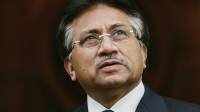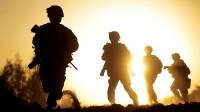For Pakistan’s own security and stability, no country is as important as Afghanistan. Due to the porous nature of their border and deep ethnic, tribal and religious linkages between the two countries, Pakistan’s security situation and stability is directly affected by the conditions in Afghanistan.
As the 2014 deadline for U.S. and NATO forces to withdraw from Afghanistan is nearing, the insecurities of President Hamid Karzai seem to be rising vertically. He has taken a strong nationalist stance and has found a convenient scapegoat in Pakistan for most of Afghanistan’s current woes. His blame game is also directed against the U.S., albeit to a lesser degree.
Clearly, Pakistan’s past policy of meddling in Afghanistan’s internal affairs has contributed toward Afghan distrust. But essentially, it is the prolonged civil war and the accompanying poor governance, pervasive corruption, drug trafficking as well as tribal and ethnic fault lines that have contributed to the Afghan government’s present turmoil.
In this chaotic scenario, Nawaz Sharif’s government faces a huge challenge of restoring a normal relationship with Afghanistan. Traditionally, civilian governments have been outsourcing Afghanistan policy to the military leadership. This time around, it is expected that the civilian government would be relatively more assertive, but much would depend on their capacity and political will in handling difficult foreign policy issues.
The most important task for Nawaz Sharif would be to convince the Afghan leadership of his sincerity and that he is in control of the foreign policy.
On the one hand, Afghan government would want us to stay away from any form of interference in Afghanistan’s internal affairs. On the other, the presence of a significant number of Taliban leaders in Pakistan, serious issues of border management and India’s high profile role in Afghanistan are factors that demand Pakistan retain influence in Afghanistan.
If Kabul were to provide excessive strategic space to New Delhi and pursue hostile policies towards it then Islamabad is likely to reciprocate by falling back on its default position of aligning with the Taliban. This could lead to Pakistan being less inclined in influencing Taliban to participate in peace negotiations and relations between the two countries will move in a downward spiral. The security situation for Pakistan could be more threatening if Afghan forces are unable to retain the territorial integrity of the country and it lapses into a civil war.
In the event that Afghan Taliban gain an upper hand it could inspire and strengthen the Pakistani Taliban. The nexus between the Afghan and Pakistani Taliban will have disastrous consequences for the integrity and nature of the Pakistani state. This reality can be ignored only at our peril.
Pakistan will have to take preventive measures for these contingencies through forward planning. Nawaz Sharif’s offer of negotiations with Pakistani Taliban when the U.S. and NATO forces are withdrawing introduces another wild card in regional and national security dynamic.
Since 2001, the United States has been a key player in influencing Pakistan’s policy on Afghanistan and the region. Washington will continue to remain closely engaged with Pakistan and seek greater cooperation during the withdrawal phase. Its efforts to arbitrate between Islamabad and Kabul have not been successful so far.
U.S. would also insist on Pakistan to release the Taliban leaders and use its influence to bring them to the negotiating table. The dialogue process with Taliban is in a limbo and it is highly doubtful if the lower and middle ranking Taliban will abandon violence, integrate in the society and be part of the political order without the blessing of Mullah Omar.
Nonetheless, Pakistan should continue in its efforts to push the Taliban to be a part of the political process to prevent the recycling of violence and facilitate the transfer of power to the Afghans.
Sharif has repeatedly expressed that the U.S. drone program should be discontinued as it reckoned to be fueling insurgency. The current shift in U.S. policy to restrict the use of drones in Pakistan should strengthen the government’s position while negotiating with the Tehrik-e-Taliban.
The U.S. success in Afghanistan would also depend to the extent Pakistan is willing and capable of confronting the terrorists and eliminating the safe havens on its side. A similar expectation is there from the Pakistani side that sanctuaries in the bordering Afghan eastern provinces where Pakistani Taliban are taking refuge will be cleared by U.S. and Afghan forces.
In order to achieve these objectives, the PML-N government will have to forge a good relationship with the leadership of both Afghan and U.S. governments. Of equal importance would be that the military and civilian leadership in Pakistan work in unison.
Moreover, the U.S. expects that the Afghan government would ensure post-2014 that the so-called democratic system and framework that has been created with their assistance is holding and the country does not plunge into a civil war. In this respect, Pakistan and U.S. objectives will converge.
Washington by entering into strategic partnership agreement with Kabul is ensuring its presence in post-withdrawal phase by retaining a number of bases in the country. The presence of nearly 20,000 U.S. and NATO forces in the post-withdrawal phase will include training personnel, Special Service contingents and air support units so that Kabul does not fall to the Taliban.
At the same time, the presence of U.S. forces could provide an incentive and a rallying cry to keep the insurgency alive.
The greater challenge will be to retain the integrity of the Afghan National Army after 2014. There are fears that ethnic and political differences may permeate the ranks of the army that has yet to gel as a strong national institution.
In 2014, Afghanistan will be holding elections, and from what is apparent President Karzai although not eligible to run for elections the third time is desperate to retain power by pitching his brother as a presidential candidate. And, if last elections are any guide, there are serious doubts if free and fair exercise will be held. This could lead to a lack of credibility and setback to the democratic process and fuel insurgency.
The new Sharif government is expected to be relatively more assertive in dealing with the Afghan and other foreign policy issues. However, the input and role of the military would remain very significant.
For the civilian government to take control of foreign issue matters would need an in-depth understanding of regional and global dynamics. Otherwise, the Service Chiefs will always outsmart them with their glossy presentations and relatively, more informed views.
During the transition period, the civilian and military leadership is likely to view each other with suspicion fearing that their power is diminishing. Nonetheless, the army leadership has come to terms with the inevitability of a democratic order for Pakistan and is pursuing a more mature and nationalistic approach.
The role of General Kayani in supporting the transition to democracy has been genuine and based on an assessment of hard realities facing the country as well as the institution. The support to democracy will have to be continued by his successor, who will be in office by November 2013.
Equally important in the march toward democracy will be the capacity and interest of the civilian leadership in matters related to foreign policy.
A former Secretary Defence Production, the writer is currently an analyst on defence and strategic affairs based in Islamabad.






















